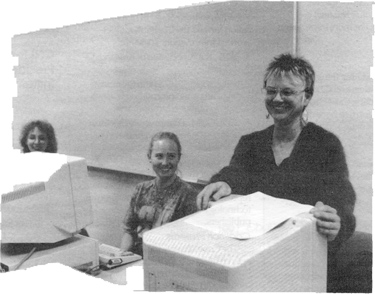| |
Writing Class Ventures into Internet by Cathering Curran Planning Strategy & Administration
Since then, Dixon's writing classes have been charting new territories. In Fall Quarter, Dixon taught an advanced composition adjunct to 12 students enrolled in Environmental Studies 10. Thanks to e-mail and the library microcomputer lab, students were soon tapping into distant databases to uncover new information and exchanging messages electronically with others near and abroad.
"The possibilities for using the Internet in teaching are fascinating and endless," says Dixon, who has taught advanced composition on campus since 1987. For the past two years, she has collaborated with Wandesforde-Smith to teach adjunct composition courses to students in his Environmental Studies classes. In an adjunct writing class, students have the opportunity to strengthen their writing skills while working on assignments that relate to the discipline or focus of the course with which the composition course is paired. Dixon says Wandesforde-Smith has promoted the use of e-mail in his courses for several years and encouraged her to use e-mail in her instruction because of its effectiveness as both a communication and research tool. Although Dixon, a lecturer in the English department, has previously taught composition classes in Macintosh computer labs, she says e-mail and other forms of electronic research have opened new frontiers, giving students the ability to obtain current information from anywhere in the world. That instant access is particularly important to environmental studies students, Dixon notes, because "there is so much on the Internet that has to do with current developments in the environment." "Environmental concerns are international concerns. Being on the Internet puts the students in touch with the world," Dixon says. One student in Dixon's fall class contacted the Finnish government in response to a plea sent through e-mail to lobby the Finnish government to save old-growth timber. In the future, Dixon says, more students will network through e-mail and, in turn use the Internet to collaborate with peers studying at other universities. Both of Dixons classes met in the microcomputer lab adjoining the Center for Advanced Information Technology (CAM on the first floor of Shields Library). "My fall composition course started in a regular classroom, but when the microcomputer lab in the library opened, the class moved there. That's where the class really took off," says Dixon. The students liked the idea of getting mail electronically, and Dixon found their ability to interact with information on the computer screen to be invigorating. "It's quite exciting to walk into a classroom and feel students are already working," says Dixon, whose students were busy checking mail messages when she arrived. When a soccer injury hospitalized a student midway through the fall session, e-mail kept him in touch with assignments and other students. "When he came back he still felt connected," Dixon says. From a teaching standpoint, Dixon says using computers poses some special challenges. Here are two things she says instructors should consider.
"I've learned that when you use machines you have to be flexible. You can't expect perfection. Things don't go as planned all of the time and you always have to be ready for glitches," says Dixon. But she's still excited about the new course her classes are taking - glitches and all. When Wandesforde-Smith sent her that e-mail message last fall, Dixon jumped on what she calls the "information train" And she has no intention of getting off.
|
